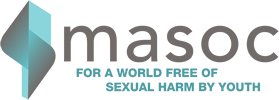Lunch & Learn Series
Spring 2025 Series | MASOC & MACAProgram Overview
CE Credits: 1 credit per session
This Lunch and Learn series is a monthly, 1-hour, high-octane focus on the emerging issues for clinicians and allied professionals working with children and youth engaging in problematic sexual behaviors. This is a collaborative effort between MACA and MASOC.
This series offers CE credits to augment this unique professional development opportunity. Credits are free to MA professionals thanks to the generous support of the Children’s Trust of MA. If you are from out of state, the cost for CE credits is $10/session.
Dates & Topics
The M-CAAP Whole-Child Assessment: Digging Into Case Formulation with Kevin Creeden, MA, LMHC
Wednesday, June 25, 11:30am-1pm ET | Register
PREVIOUS SESSIONS
View previous sessions on our Recorded Webinars page.
June 25, 2025 | 11:30 AM – 1:00 PM ET
The M-CAAP Whole-Child Assessment: Digging Into Case Formulation
Presenter: Kevin Creeden, MA, LMHC
One of the benefits of comprehensive assessment is the ability to use the assessment for treatment planning, case management, effective referrals, and communication with stakeholders in a young person’s care. And one of the trickiest parts of comprehensive assessment is writing effective case formulations. Kevin Creeden, MA, LMHC will take participants through the format of effective case formulation, tools and strategies for organizing an effective case formulation, and examples of how to approach common issues in your case write-ups.
This special Lunch & Learn is at a different time: Wednesday, June 25 from 11:30 AM to 1 PM ET. Registration is required, and it is free. CE credits are not available.
Previous Sessions in This Series
January 21, 2025 | 12:00-1:00 PM ET
Leading the Way: Five Years of Implementing a Collaborative Statewide Initiative on Problematic Sexual Behaviors
Presenters: Christa M. Collier M.S., LSW, and Christina Paskewicz, MSW, MPA
Nearly 30% of referrals to Children’s Advocacy Centers in MA involve child-to-child sexual abuse, but for many years, CACs did not serve children with problematic sexual behaviors. In July 2020, the Massachusetts Children’s Alliance (MACA), launched a new pilot program with the Children’s Advocacy Centers in Massachusetts, to lead statewide awareness and interventions in CACs for children exhibiting PSBs. In partnership with the National Center on the
Sexual Behavior of Youth (NCSBY) / University of Oklahoma (OU), nearly 90 clinicians serving eight CACs and their mental health partners have been trained in evidence-based Problematic Sexual Behavior-Cognitive Behavioral Therapy (PSB-CBT).
Christa Collier, MS, LSW and Christina Paskiwecz, MSW, MPA will share the perspective and process of leading this initiative, providing an overview of the initiative’s preliminary data, including the expansion of access to mental health supports for children with PSBs in Massachusetts.
Porn Literacy for Adolescents
Presenters: Jess Alder, MPA and David Goldstajzn, PhD
The Boston Public Health Commission’s Start Strong program is an international leader in utilizing media literacy projects to engender conversations in preventing teen dating violence and promoting healthy relationships. Research suggests that virtually all U.S. youth have seen sexually explicit media (i.e., pornography) once or more by the time that they are 18. Using qualitative and quantitative research with youth about their use of pornography and dating experiences, and expertise in youth-developed and trauma-informed frameworks, BPHC created The Truth About Pornography, a nine-session pornography literacy curriculum The curriculum engenders conversations around porn, increasing healthy communication, and emphasizing consent.
This session describes the research underpinning the curriculum, its goals, efficacy, and implementation.
March 18, 2025 | 12:00-1:00 PM ET
Inclusive Approaches to Preventing Sexual Abuse in Youth Serving Organizations: Lessons from Disability Services and Adaptive Sports
Presenter: Meg Stone, MPH
When You Offer Help, People Take It: Exploring Help-Seeking by Teens with Problematic Sexual Behaviors and Interests
Presenters: Jenny Coleman, MA, LMHC; Ryan Shields, Ph.D.
For many decades, conventional wisdom has held that the only effective way to intervene with people–including teens–with a sexual interest in younger children is to aggressively seek out, prosecute, and isolate them. Emerging research is giving a broader, more-nuanced understanding of this group of individuals, particularly young people. Two help resource programs–WhatsOK.org and Help Wanted–have early evaluation data which shows that young people with problematic sexual interests are very often aware of and concerned by their own behaviors and interests, and are seeking help and support for them.
May 20, 2025 | 12:00-1:00 PM ET
Problem Sexual Behavior in Popular Culture: Considering How to Effectively Use Media Moments for Education and Advocacy
Presenters: Seth Wescott, LMLP ATSA-F and Steph Trilling, LICSW
The spring TV lineup has unexpectedly put PSB (and aggression by adolescents more generally) in the public eye. From Adolescence on Netflix to a story line about sibling sexual behavior on White Lotus, conversation about our work is suddenly everywhere. Some educators and practitioners are itching to use clips in their education and clinical work, others of us are trying to dispel misconceptions or bring info to our communities. This lunch and learn will look at both the opportunities for pop culture moments to create conversation opportunities on topics that can be hard to bring up and the complex clinical and pedagogical questions that come from using popular media for conversation. We’ll discuss how to effectively use media in a developmentally appropriate, trauma-informed way in prevention settings, as well as how to leverage our professional expertise for effective moments of community education and advocacy.
Continuing Education for Clinicians
Looking for more professional development and continuing education opportunities? MASOC offers two annual conferences, regular lunch and learns, and on-demand webinars to inform practitioners of best-practices, treatment approaches and emerging research on problematic sexual behaviors.
